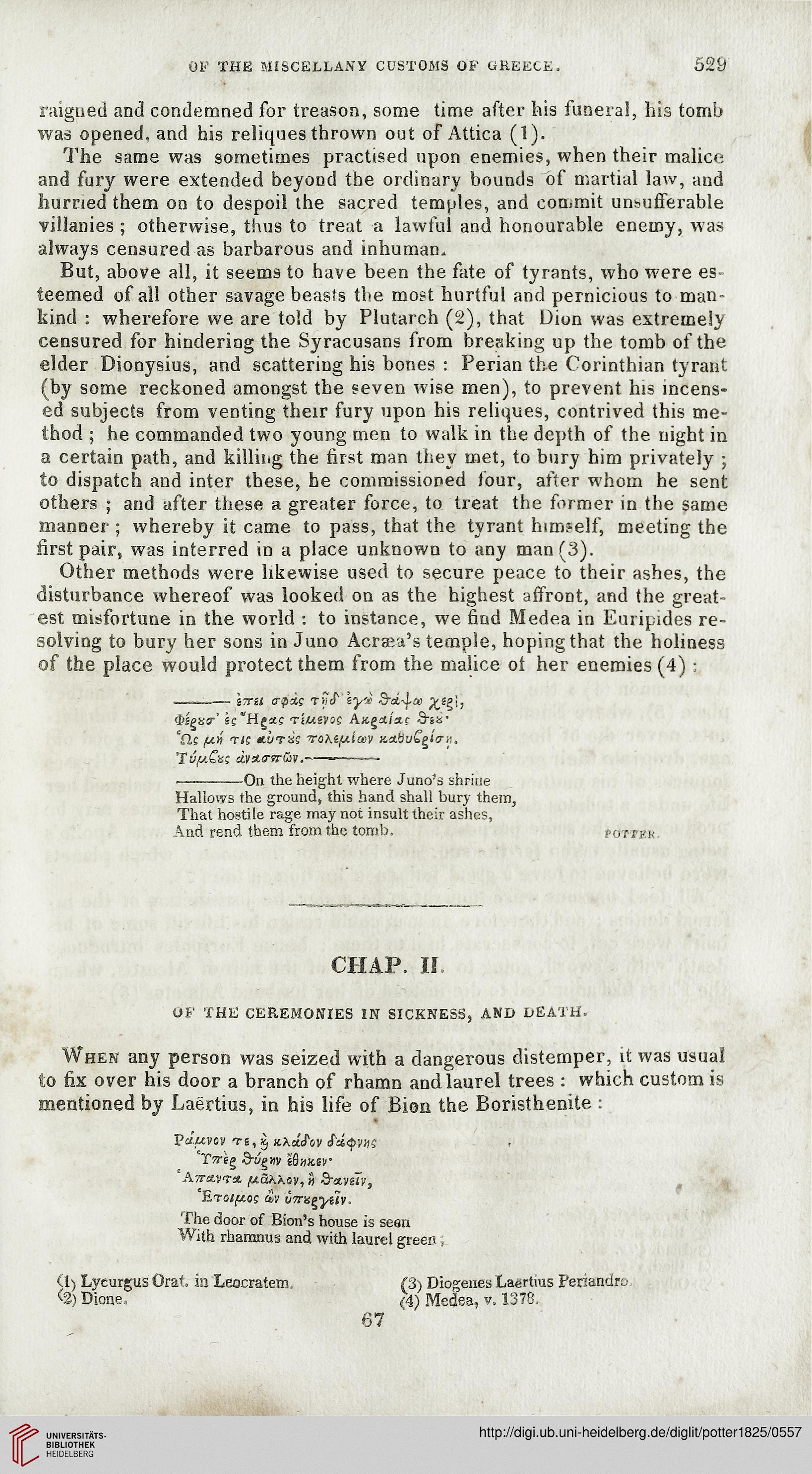oe the miscellany customs of okeece,
529
raigued and condemned for treason, some time after his funeral, his tomb
was opened, and his reliques thrown out of Attica (1).
The same was sometimes practised upon enemies, when their malice
and fury were extended beyond the ordinary bounds of martial law, and
hurried them on to despoil the sacred temples, and commit unsutferable
villanies ; otherwise, thus to treat a lawful and honourable enemy, was
always censured as barbarous and inhuman.
But, above all, it seems to have been the fate of tyrants, who were es-
teemed of all other savage beasts the most hurtful and pernicious to man -
kind : wherefore we are told by Plutarch (2), that Dion was extremely
censured for hindering the Syracusans from bre?iking up the tomb of the
elder Dionysius, and scattering his bones : Perian the Corinthian tyrant
(by some reckoned amongst the seven wise men), to prevent his incens-
ed subjects from venting their fury upon his reliques, contrived this me-
thod ; he commanded two young men to walk in the depth of the night in
a certain path, and killing the first man they met, to bury him privately ;
to dispatch and inter these, he commissioned four, after whom he sent
others ; and after these a greater force, to treat the former in the same
manner ; whereby it came to pass, that the tyrant him?elf, meeting the
first pair, was interred in a place unknown to any man (3).
Other methods were likewise used to secure peace to their ashes, the
disturbance whereof was looked on as the highest affront, and the great-
est misfortune in the world : to instance, we find Medea in Enripides re-
solving to bury her sons in Juno Acraea's temple, hoping that the holiness
of the place would protect them from the malice ot her enemies (4) :
--\ttu trpdg TtieT' iyi &d^-a> £egi,
<J>igwr' sc"Hjstf Tiuevoe Ajtga/stf 3"ss-
"flc jttrf TK *-UTXS TOKifxiaiV J£*tfuCgf(7i!,
-On the height where Juno's shrine
Hallows the ground, this hand shall bury them,
That hostile rage may not insult their ashes,
And rend them from the tomb, *>ottek.
CHAP. II
of the ceremonies in sickness, and death.
When any person was seized with a dangerous distemper, it was usual
to fix over his door a branch of rhamn and laurel trees : which custom is
mentioned by Laertius, in his life of Bion the Boristhenite :
'Tirsg eflxjcsv
The door of Bion's house is seen
With rhamnus and with laurel green i
(i) Lycurgus Oral, in Leocratem. (3) Diogenes Laertius Periandro
<2) Dione, (4) Medea, v. 1378.
67
529
raigued and condemned for treason, some time after his funeral, his tomb
was opened, and his reliques thrown out of Attica (1).
The same was sometimes practised upon enemies, when their malice
and fury were extended beyond the ordinary bounds of martial law, and
hurried them on to despoil the sacred temples, and commit unsutferable
villanies ; otherwise, thus to treat a lawful and honourable enemy, was
always censured as barbarous and inhuman.
But, above all, it seems to have been the fate of tyrants, who were es-
teemed of all other savage beasts the most hurtful and pernicious to man -
kind : wherefore we are told by Plutarch (2), that Dion was extremely
censured for hindering the Syracusans from bre?iking up the tomb of the
elder Dionysius, and scattering his bones : Perian the Corinthian tyrant
(by some reckoned amongst the seven wise men), to prevent his incens-
ed subjects from venting their fury upon his reliques, contrived this me-
thod ; he commanded two young men to walk in the depth of the night in
a certain path, and killing the first man they met, to bury him privately ;
to dispatch and inter these, he commissioned four, after whom he sent
others ; and after these a greater force, to treat the former in the same
manner ; whereby it came to pass, that the tyrant him?elf, meeting the
first pair, was interred in a place unknown to any man (3).
Other methods were likewise used to secure peace to their ashes, the
disturbance whereof was looked on as the highest affront, and the great-
est misfortune in the world : to instance, we find Medea in Enripides re-
solving to bury her sons in Juno Acraea's temple, hoping that the holiness
of the place would protect them from the malice ot her enemies (4) :
--\ttu trpdg TtieT' iyi &d^-a> £egi,
<J>igwr' sc"Hjstf Tiuevoe Ajtga/stf 3"ss-
"flc jttrf TK *-UTXS TOKifxiaiV J£*tfuCgf(7i!,
-On the height where Juno's shrine
Hallows the ground, this hand shall bury them,
That hostile rage may not insult their ashes,
And rend them from the tomb, *>ottek.
CHAP. II
of the ceremonies in sickness, and death.
When any person was seized with a dangerous distemper, it was usual
to fix over his door a branch of rhamn and laurel trees : which custom is
mentioned by Laertius, in his life of Bion the Boristhenite :
'Tirsg eflxjcsv
The door of Bion's house is seen
With rhamnus and with laurel green i
(i) Lycurgus Oral, in Leocratem. (3) Diogenes Laertius Periandro
<2) Dione, (4) Medea, v. 1378.
67




